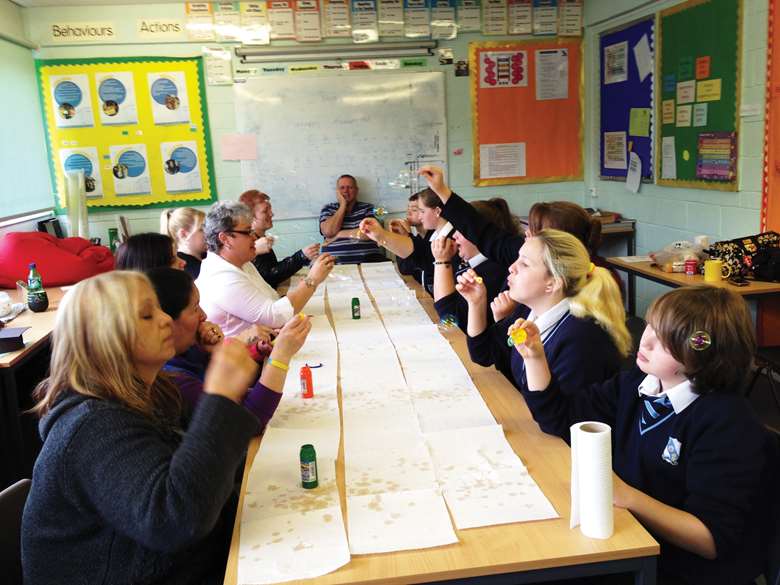How group therapy helps children stay in school
Jo Stephenson
Tuesday, February 18, 2014
Family Group improves parent-child relationships as well as children's emotional wellbeing, self-esteem, behaviour and attainment.

Project Family Group
Purpose To tackle truancy and exclusions by working with whole families
Funding The annual cost of the entire Family Group (comprised of eight families, an average of six who attend Family Group weekly) is £18,500, making the cost of each family’s therapy per year £2,312 (£18,500 divided by eight), or £3,083 (£18,500 divided by six). Funders include the Paul Hamlyn Foundation, John Lyons Charity, Richmond Parish Lands Charity, Hampton Fuel Allotment Charity, Comic Relief and schools
Background Children who display emotional and behavioural difficulties in school often don't get the mental health support they need. Research shows a strong link between challenging behaviour and poor outcomes in later life. In September 2010, social enterprise The School and Family Works started running a group intervention in schools, based on the "Marlborough Model" created by Eia Asen, Neil Dawson and Brenda McHugh. "It brings everyone you need into the room at the same time – child, parent, a member of school leadership team and an independent mental health person," explains educational psychotherapist Mark Griffiths, chief executive of The School and Family Works.
Action The Paul Hamlyn Foundation funded the first three Family Group schemes and there are now 10 in a mix of primary, secondary and special schools.
As part of an initial recruitment phase, all families in a year group are invited to an information session, but, as Griffiths explains, "generally no one attends". Families that would benefit most are then contacted individually. They often miss or cancel meetings, but the team is "very persistent".
"The parents we are dealing with may not have had anyone take a real interest in them and their children before," he says. "We demonstrate commitment, reliability and that we have faith in them."
Groups are run by a Family Group therapist and school partner who may be the deputy head or special educational needs co-ordinator. About eight families attend - a child and at least one parent. Sessions start with parents and children setting "internal targets" for the child for that session. These targets are regularly scored and monitored during an activity such as playing a board game or arts and crafts with the whole group making suggestions.
Next, ongoing "external targets" are discussed. These might include getting to school on time or not swearing. Teachers and parents will have scored children on how well they have done during the week.
Finally, there is a period of "parent reflection time" for up to an hour after children return to the normal school day. Parents analyse what happened in the session and talk about the links between a child's behaviour and feelings, often relating back to experiences in their own childhood. The school partner and therapist then have a debrief.
The scheme, which draws heavily on attachment theory, works with families for "as long as they need", says Griffiths, but the average is 14 months. When children have made substantial progress, they "graduate" with a celebration. If parents still need support, there is a "graduate programme" where they continue to meet regularly.
The intervention works because it sees "the whole picture", is non-judgmental and trust is built up over time while families gain confidence and self-esteem by helping others, says Griffiths. At least two more Family Groups are due to launch in September, as well as the project's first partnership with a local authority involving two schools.
Outcome Family Group was one of three Paul Hamlyn Foundation-funded projects evaluated by the Office of Public Management in a two-year study published in December 2013. This looked at four Family Group schemes run with SWIFT (Services Working in Feltham and Hanworth Together) and concluded the impact was "uniformly positive" with improved parent-child relationships, improved emotional wellbeing, behaviour and learning among children, increased confidence and reduced stress for parents, and improved relationships between schools and parents.
Data gathered by The School and Family Works shows that at Victoria Junior School in Feltham, there was a significant drop in the number of days of education lost to exclusion from 58.5 days in 2009/10 before Family Group started at the school to just five days in 2012/13. There is evidence the scheme boosts attainment. For example, results from Clarendon School in Richmond, a school for children with moderate learning difficulties, show in 2012/13 Family Group pupils made above school average progress in maths and science. Reading had progressed by an average of 11.5 months compared with 0.75 months in the previous year.
If you think your project is worthy of inclusion, email supporting data to ravi.chandiramani@markallengroup.com




